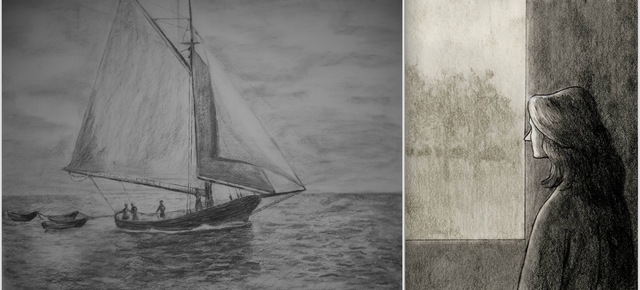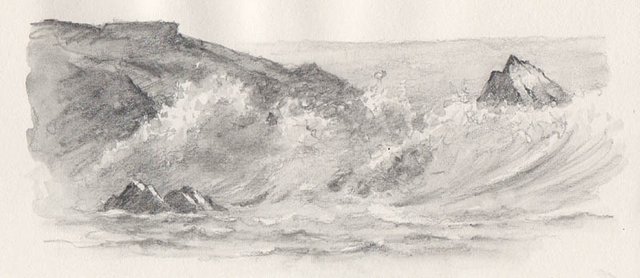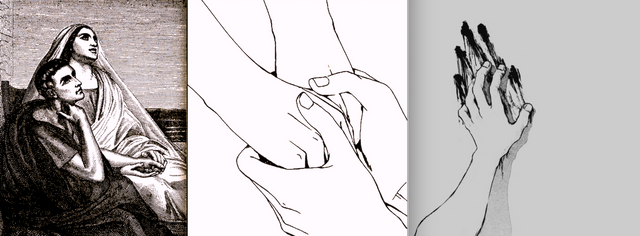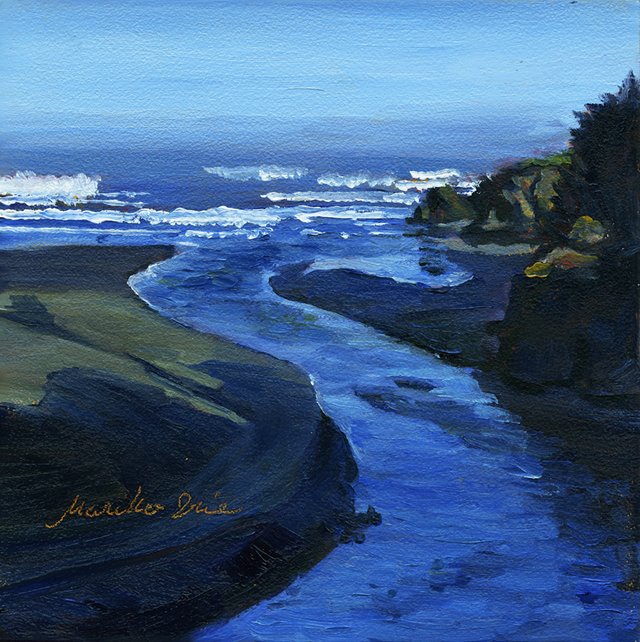
“Why I left the one country and went to the other, You Knew, O God, but you did not tell either me or my mother. She indeed was in dreadful grief at my going and followed me right to the seacoast. There she clung to me passionately, determined that I should either go back home with her or take her to Rome with me, but I deceived her with the pretence that I had a friend whom I did not want to leave until he has sailed off with the fair wind. Thus, I lied to my mother, and such a mother; and so, got away from her. But this also You have mercifully forgiven me, bringing me from the water of Your grace; so that when I was washed clean, the floods that poured from my mother’s eyes, the tears with which daily she watered the ground towards which she bent her face in prayer for me, should cease to flow. She would not return home without me, but I managed with some difficulty to persuade her to spend the night in a place near the ship where there was an oratory in memory of St. Cyprian. That night I stole away without her: she remained praying and weeping. And what was she praying for, O my God, with all those tears but that You should not allow me to sail! But You saw deeper and granted the essential of her prayer: You did not do what she was at that moment asking, that You might do the thing she was always asking. The wind blew and filled our sails and the shore dropped from our sight. And the next morning she was frantic with grief and filled Your ears with her moaning and complaints because You seemed to treat her tears so lightly, when in fact You were using my own desires to snatch me away for the healing of those desires and were justly punishing her own to earthly affection for me with the scourge of grief. For she loved to have me with her, as is the way of mothers but far more than most mothers; and she did not realize what joys you would bring her from my going away. She did not realize it, and so she wept and lamented, and by the torments she suffered showed the heritage of Eve in her, seeking with sorrow what in sorrow she had brought forth. But when she had poured out all her accusation at my cruel deception, she turned once more to prayer to You for me. She went home and I to Rome.” – Saint Augustine (397-400)

The Confessions is an autobiographical work written by Saint Augustine of Hippo between AD 397 and 400. It is an intellectual and emotional examination of the soul, in which Augustine questions the relationship between the heart and the head.
Augustine and his mother Monica had a difficult relationship mostly because of the differences in their beliefs. Monica was a pious Christian whose most fervent wish was that her son Augustine might convert to Christianity. Augustine did not have the same views about religion as his mother did, and he renounced the Christian faith publicly when he joined the Manicheans, which “crushed her to the earth; She would have grieved less over the news of her son’s death.” (41)
Monica tried to reason with her son when he visited her and recounted a dream that assured her that her son would come back to his senses and be by her side. “Perhaps, suggests her son, anxious to turn it to his own advantage, ‘It means that you will come to see things as I do.’” Saint Monica, replies firmly, “’No, - for he did not say, ‘where he is, you shall be,’ but Where you are, there he shall be.” (43)

Augustine desired recognition in his work, and his friends persuaded him that he would “meet the honor that he deserved” if he sailed for Rome. When his mother heard that her son was sailing for Rome, she was alarmed and concerned for his life. As a non-believer her son was setting himself for failure and deception in her opinion. “What would become of Augustine in Rome? Without faith, without ideals, he was a disabled ship, drifting with every wind.” (44)
The scene focuses on grief and guilt between the mother and son before his departure for Rome. Augustine’s mother tried to stop him from leaving. Augustine asked his mother to go rest at the church. Because of the bad weather, the ship would not sail anyway, and in the morning, they would sail together.
The weather got better that night and Augustine sailed for Rome, leaving his mother behind. “She went home and I to Rome” (1190)
In this passage Augustine confessed his guilt resulting from his awareness of the pain he had inflicted on her. “I lied to my mother,” he says, “and to such mother!” (1190)
He was tormented by his mother’s pain because she genuinely wanted only her son’s success, and as a mother and wiser woman, she could predict that her son might fall into living a sinful life and be unhappy. She believed that faith was a good source of containment and God “whose mercy cannot fail” was her whole world. (44) She was grieving for her son as if she knew she had lost him already. Therefore, she turned to God in prayer to bring her son to his senses.
Augustine had to take his own path to understand that all paths end up meeting on the only path to God. “Why I left the one country and went to the other, You Knew, O God, but you did not tell either me or my mother.” (1189)

"The river meets the ocean"
The passage also brings up the comparison with Dido’s and Aeneas’ scene of farewell. Aeneas loves Dido but has to leave her to fulfill the prophecy about him; Dido pleads for him not to leave but he leaves anyway. The passage also repeatedly evokes the weeping of Saint Monica over her son which is compared to baptism and “the cleansing of the soul” (1190)
In this scene, Augustine shared with us that a lesson can only be learned with experience. In order to fully believe in God, he had to feel the pain and experience on his own the doubts and confusion about the mind, the soul, and the world at large.
Art Class: Boat in Water. Charcoal on paper. 2018
Augustine. Confessions. The Norton Anthology: Western Literature. Ed. Peter, Simon. New
York: W.W Norton & Company, Inc 2014. P.1189-90
Forbes, F.A. Saint Monica. Model of Christian Mothers: Monica’s Heartbreak. TAN Books.
Charlotte: North Carolina, 2011. P.40-44
Hand Sketch, Google Images. 2018
Saint Monica and Saint Augustine Portrait. Getty Images. 2018
Shannon, Drew. Illustrations: Woman at the window. 2016
Mariko, Irie. River Entrance: The River Meets the Ocean. 2012
David Bellamy. My Art: Windy Waves. 2018